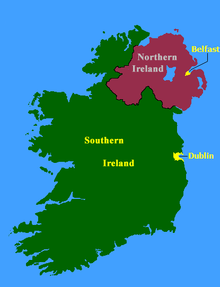Partition (politics)
Appearance
This article needs additional citations for verification. (December 2007) |

In politics, a partition is a change of political borders cutting through at least one territory considered a homeland by some community.[1] That change is done primarily by diplomatic means, and use of military force is negligible.[citation needed]
Common arguments for partitions include:
- historicist — that partition is inevitable, or already in progress[1]
- last resort — that partition should be pursued to avoid the worst outcomes (genocide or large-scale ethnic expulsion), if all other means fail[1]
- cost-benefit — that partition offers a better prospect of conflict reduction than the if existing borders are not changed[1]
- better tomorrow — that partition will reduce current violence and conflict, and that the new more homogenized states will be more stable[1]
- rigorous end — heterogeneity leads to problems, hence homogeneous states should be the goal of any policy[1]
Common arguments against include:
- It disrupts functioning and traditional state entities
- It creates enormous human suffering
- It creates new grievances that could eventually lead to more deadly violence, such as the Korean and Vietnamese wars.
- It prioritizes race and ethnicity to a level acceptable only to an apartheid regime
- The international system is very reluctant to accept the idea of partition in deeply divided societies
Examples
Notable examples are: (See Category:Partition)
- Partition of Africa (Scramble for Africa), between 1881 and 1914.
- Partition, multiple times, of the Roman Empire into the Eastern Roman Empire and the Western Roman Empire, following the Crisis of the Third Century.
- Partition of Prussia by the Second Peace of Thorn in 1466[2] [3] creating Royal Prussia, and Duchy of Prussia in 1525[4]
- Partition of Catalonia by the Treaty of the Pyrenees in 1659: Northern Catalan territories (Roussillon) was given to France by Spain.
- In the 1757 Second Treaty of Versailles, France agreed upon the partition of Prussia[5]
- Partition of the United States during the American Civil War.
- Partition of Prussia in 1919[6]
- German occupation of Czechoslovakia[7] and Munich Agreement of 1938
- Partition and Elimination[8] of East Prussia[9] among People's Republic of Poland and Soviet Union[10]
- Three Partitions of Luxembourg, the last of which in 1839, that divided Luxembourg between France, Prussia, Belgium, and the independent Grand Duchy of Luxembourg.
- Three Partitions of Poland and Poland-Lithuania in the 18th, with the fourth one sometimes referring to events of 19th and 20th centuries
- 1905 Partition of Bengal and 1947 Partition of Bengal
- Partition of Tyrol by the London Pact of 1915
- Partition of the German Empire in 1919 by the Treaty of Versailles
- Partition of the Ottoman Empire
- Partition of the Austrian-Hungarian Empire in 1919 by the Treaty of St. Germain
- Partition of Ireland in 1920 into the independent Irish Free State and (British) Northern Ireland
- Treaty of Kars of 1921, which partitioned Ottoman Armenia between the republic of Turkey and the then Soviet Union (Western and Eastern Armenia)
- Partition of Germany and Berlin after World War II, annexation of former eastern territories of Germany
- Partition of Korea in 1945
- 1947 UN Partition Plan for Palestine (region); this partition was abortive, as the proposed Palestinian state was never formed; Israel took most of the territory, with some going to Transjordan and Egypt.
- Partition of India (colonial British India) in 1947 into the independent dominions (later republics) of India and Pakistan (which included modern-day Bangladesh)
- Partition of Korea in 1953
- Partition of Punjab in 1966 into the states of Punjab, Haryana and Himachal Pradesh
- Partition of Pakistan in 1971, when East Pakistan became the independent nation of Bangladesh after the Bangladesh Liberation War
- Partition of Vietnam in 1954
- The hypothetical partition of the Canadian province of Quebec
- Partition of Yugoslavia in the 1990's
- Possible Partition of Kosovo after disputed independence in 2008.
- Partitions of China (See 瓜分中國)
See also
References
- ^ a b c d e f Brendan O’Leary, DEBATING PARTITION: JUSTIFICATIONS AND CRITIQUES
- ^ Norman Davies: God's Playground [1]
- ^ Stephen R. Turnbull, Tannenberg 1410: Disaster for the Teutonic Knights [2]
- ^ Elements of General History: Ancient and Modern, by Millot (Claude François Xavier) [3]
- ^ Arthur Hassall, The Balance of Power. 1715–1789 [4]
- ^ Norman Davies: God's Playground [5]
- ^ The Polish Occupation. Czechoslovakia was, of course, mutilated not only by Germany. Poland and Hungary also each asked for their share – Hubert Ripka: Munich, Before and After: A Fully Documented Czechoslovak Account of the ..., 1939 [6]
- ^ Samuel Leonard Sharp: Poland, White Eagle on a Red Field, [7]
- ^ Norman Davies: God's Playground [8]
- ^ Debates of the Senate of the Dominion of Canada [9]
